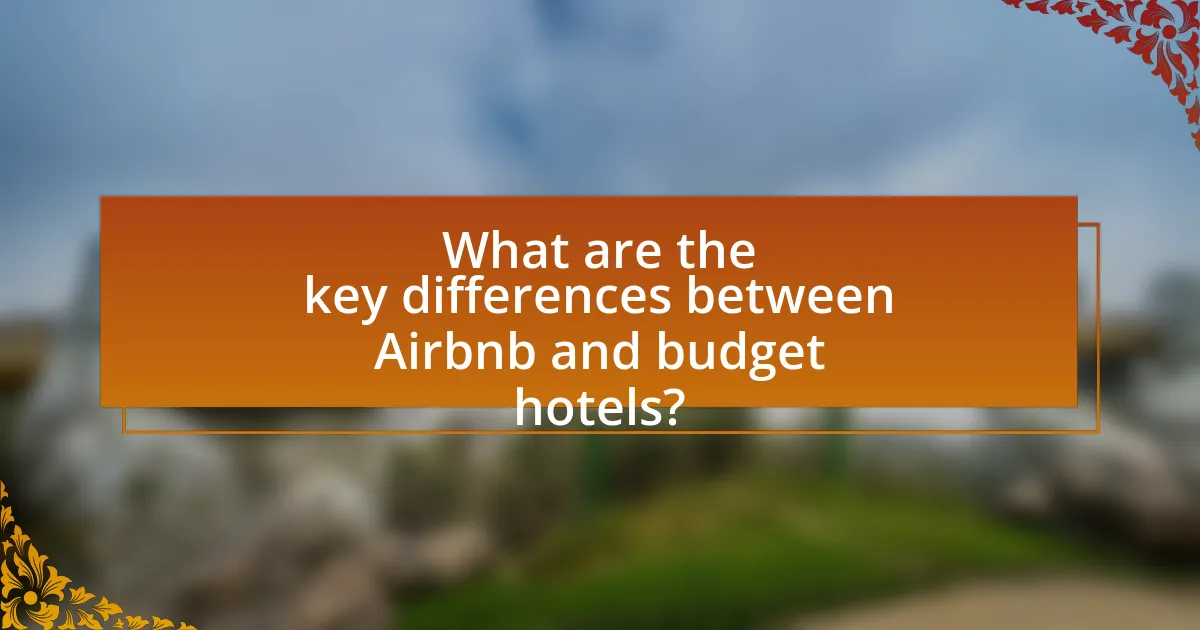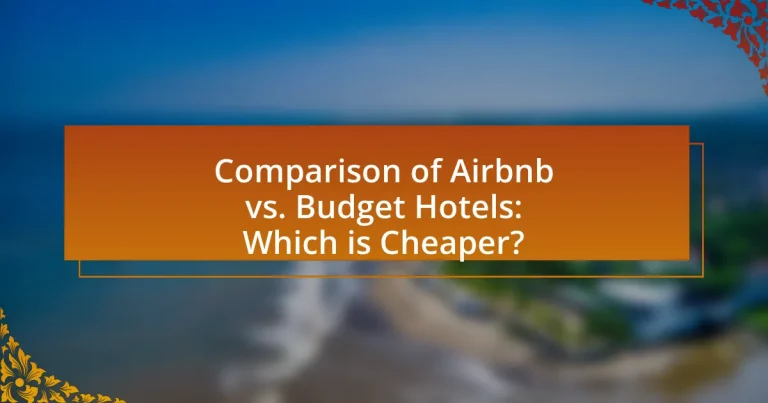The article provides a detailed comparison between Airbnb and budget hotels, focusing on their key differences in accommodation types, pricing structures, and amenities. It highlights how Airbnb offers a variety of lodging options with dynamic pricing influenced by location and demand, while budget hotels provide standardized rooms with fixed pricing and essential services. The discussion includes factors affecting pricing, unique features of each option, and the pros and cons of choosing one over the other. Additionally, it offers insights into how travelers can determine the most cost-effective choice based on total costs, booking timing, and available amenities.

What are the key differences between Airbnb and budget hotels?
Airbnb and budget hotels differ primarily in their accommodation types and pricing structures. Airbnb offers a variety of lodging options, including entire homes, private rooms, and shared spaces, often at competitive prices that can vary widely based on location and demand. In contrast, budget hotels typically provide standardized rooms with basic amenities and fixed pricing, which can be more predictable but less flexible than Airbnb’s offerings. Additionally, Airbnb hosts may provide unique local experiences and personalized services, while budget hotels generally focus on essential services and consistency across locations. This distinction highlights the diverse experiences and pricing strategies available to travelers choosing between these two options.
How do pricing structures compare between Airbnb and budget hotels?
Airbnb pricing structures typically offer more variability compared to budget hotels, often reflecting the unique characteristics of individual listings. While budget hotels generally have fixed rates based on room type and seasonality, Airbnb hosts can set dynamic pricing influenced by demand, location, and property features. For instance, a study by the University of California, Berkeley, found that Airbnb prices can fluctuate significantly, with some listings charging up to 50% more during peak travel seasons compared to their off-peak rates. In contrast, budget hotels maintain more consistent pricing, which can be easier for consumers to predict.
What factors influence the pricing of Airbnb rentals?
The pricing of Airbnb rentals is influenced by several key factors, including location, property type, amenities, seasonality, and host experience. Location significantly impacts rental prices, as properties in popular tourist destinations or urban centers typically command higher rates due to demand. The type of property, whether it is an entire home, a private room, or a shared space, also affects pricing, with entire homes generally being more expensive. Amenities offered, such as Wi-Fi, parking, or a pool, can justify higher prices as they enhance the guest experience. Seasonality plays a crucial role, with prices often increasing during peak travel seasons or local events. Lastly, the experience and reputation of the host, reflected in reviews and ratings, can influence pricing, as highly-rated hosts may charge more for their rentals.
How do budget hotel pricing strategies work?
Budget hotel pricing strategies primarily rely on competitive pricing, dynamic pricing, and value-based pricing to attract cost-conscious travelers. Competitive pricing involves setting rates based on the prices of similar accommodations in the area, ensuring that budget hotels remain appealing compared to alternatives. Dynamic pricing adjusts rates in real-time based on demand fluctuations, occupancy levels, and market trends, allowing hotels to maximize revenue during peak times while offering lower rates during off-peak periods. Value-based pricing focuses on the perceived value of the services offered, such as amenities and location, to justify pricing decisions. These strategies are supported by data analytics, which help hotels understand customer behavior and optimize pricing accordingly.
What amenities do Airbnb and budget hotels typically offer?
Airbnb and budget hotels typically offer amenities such as free Wi-Fi, basic toiletries, and kitchen facilities. Airbnb properties often include unique features like local decor and personalized touches, while budget hotels provide standardized services like daily housekeeping and complimentary breakfast. According to a 2021 study by Statista, 70% of Airbnb listings offer kitchen amenities, which is a significant draw for travelers seeking cost-effective meal options. Budget hotels, on the other hand, frequently include essential services like 24-hour front desk assistance and parking, catering to guests looking for convenience and affordability.
What unique features can be found in Airbnb accommodations?
Airbnb accommodations often feature unique elements such as personalized decor, local experiences, and diverse property types, including treehouses, yurts, and villas. These distinctive characteristics set them apart from traditional budget hotels, which typically offer standardized rooms. For instance, a study by the Harvard Business School found that 60% of Airbnb listings provide unique amenities like hot tubs or pools, enhancing the guest experience. Additionally, many Airbnb hosts offer local insights and personalized recommendations, fostering a more immersive travel experience compared to the generic service often found in budget hotels.
How do budget hotels cater to guest needs?
Budget hotels cater to guest needs by offering essential amenities at affordable prices, ensuring a comfortable stay without unnecessary luxuries. They typically provide clean rooms, basic furnishings, and essential services such as free Wi-Fi, breakfast options, and 24-hour front desk assistance. According to a study by the American Hotel and Lodging Educational Institute, budget hotels often focus on maximizing value for money, which appeals to cost-conscious travelers. This approach allows them to meet the fundamental expectations of guests while maintaining lower operational costs compared to higher-end accommodations.
How do location and availability affect costs?
Location and availability significantly influence costs in the hospitality sector. Properties situated in high-demand areas, such as city centers or tourist attractions, typically command higher prices due to increased competition and limited supply. For instance, a study by the American Hotel and Lodging Educational Institute found that hotel rates in prime locations can be 30% to 50% higher than those in less desirable areas. Additionally, availability affects costs through seasonal fluctuations; during peak travel seasons, prices for both Airbnb rentals and budget hotels often rise due to heightened demand. This dynamic pricing model is evident in platforms like Airbnb, where hosts adjust rates based on local events or occupancy levels, further illustrating how location and availability directly correlate with cost variations.
What role does location play in Airbnb pricing?
Location significantly influences Airbnb pricing, as properties situated in desirable areas typically command higher rates. For instance, listings in urban centers or near popular attractions often see prices that are 20-50% higher than those in less sought-after neighborhoods. This trend is supported by data from Airbnb’s own market analysis, which shows that proximity to landmarks, public transport, and amenities directly correlates with increased nightly rates. Additionally, local demand and seasonal variations further affect pricing, with peak tourist seasons leading to inflated rates in high-demand locations.
How do budget hotels price their rooms based on location?
Budget hotels price their rooms based on location by analyzing demand, competition, and proximity to attractions. Hotels in high-demand areas, such as city centers or tourist hotspots, typically charge higher rates due to increased occupancy rates and the willingness of guests to pay more for convenience. Conversely, budget hotels in less desirable locations may offer lower prices to attract customers. According to a study by STR Global, hotels located within a mile of major attractions can charge up to 30% more than those situated further away, demonstrating the significant impact of location on pricing strategies.

What are the pros and cons of choosing Airbnb over budget hotels?
Choosing Airbnb over budget hotels offers unique advantages and disadvantages. The primary pros include often lower prices, especially for larger groups, and the availability of amenities like kitchens, which can reduce food costs. Additionally, Airbnb provides a variety of unique accommodations and local experiences that budget hotels may not offer. On the other hand, the cons include potential inconsistencies in quality and service, as well as the lack of standardized customer support that budget hotels typically provide. Furthermore, some Airbnb listings may have hidden fees, such as cleaning charges, which can increase the overall cost unexpectedly.
What advantages does Airbnb provide for travelers?
Airbnb provides travelers with unique accommodations, often at lower prices than traditional hotels. This platform allows access to a diverse range of lodging options, including entire homes, private rooms, and unique stays like treehouses or villas, catering to various preferences and budgets. According to a 2021 study by the Harvard Business School, Airbnb listings are typically 20-30% cheaper than comparable hotel rooms, making it a cost-effective choice for many travelers. Additionally, Airbnb offers the opportunity for travelers to experience local culture more intimately, as many hosts provide personalized recommendations and insights about the area.
How does the local experience differ when staying in an Airbnb?
Staying in an Airbnb typically offers a more immersive local experience compared to budget hotels. Airbnb accommodations are often located in residential neighborhoods, allowing guests to engage with local culture, cuisine, and community life more directly. For instance, guests may have access to unique local recommendations from hosts, such as hidden dining spots or cultural events, which are less likely to be provided by budget hotels. Additionally, many Airbnb properties feature local decor and amenities that reflect the area’s character, enhancing the overall experience. This localized approach can lead to a deeper understanding of the destination, as supported by a study from the Harvard Business School, which found that Airbnb guests often report higher satisfaction levels due to their interactions with local environments and communities.
What cost-saving opportunities exist with Airbnb rentals?
Cost-saving opportunities with Airbnb rentals include lower accommodation rates, the ability to cook meals, and potential discounts for longer stays. Airbnb often offers prices that are more competitive than budget hotels, especially in high-demand areas. Additionally, many Airbnb properties come equipped with kitchens, allowing guests to prepare their own meals, which can significantly reduce food expenses. Furthermore, hosts frequently provide discounts for weekly or monthly bookings, making longer stays more economical compared to nightly hotel rates.
What drawbacks should travelers consider with Airbnb?
Travelers should consider several drawbacks when using Airbnb, including inconsistent quality, potential hidden fees, and varying levels of customer service. Inconsistent quality arises because each listing is individually managed, leading to significant differences in cleanliness, amenities, and overall experience. Hidden fees, such as cleaning charges and service fees, can inflate the total cost beyond the initial listing price, making it difficult to compare with budget hotels. Additionally, customer service can be less reliable, as travelers may face challenges in communication with hosts or in resolving issues, unlike the standardized support typically offered by hotels. These factors can impact the overall satisfaction and value of the Airbnb experience compared to budget hotel options.
How does the variability in quality affect Airbnb stays?
Variability in quality significantly affects Airbnb stays by influencing guest satisfaction and overall experience. Guests often encounter a wide range of property conditions, amenities, and host responsiveness, leading to inconsistent experiences. For instance, a study by the Journal of Travel Research found that 70% of Airbnb users reported that property quality directly impacted their likelihood of rebooking. This inconsistency can result in negative reviews, which can deter potential guests and affect a host’s overall rating and income.
What are the potential hidden costs associated with Airbnb?
Potential hidden costs associated with Airbnb include cleaning fees, service fees, and additional charges for extra guests. Cleaning fees can significantly increase the total cost of a stay, often ranging from $50 to $150, depending on the property. Service fees, which Airbnb charges for booking, can add another 5% to 15% to the total price. Additionally, hosts may impose extra charges for additional guests beyond a set limit, which can further inflate the overall expense. These costs are not always clearly disclosed in the initial listing price, making it essential for travelers to review the total breakdown before booking.
What benefits do budget hotels offer compared to Airbnb?
Budget hotels offer consistent service and amenities that Airbnb may not guarantee. Budget hotels typically provide standardized accommodations, including daily housekeeping, 24-hour front desk support, and on-site facilities like breakfast and Wi-Fi, which can enhance the overall guest experience. In contrast, Airbnb properties can vary significantly in quality and service, as they are often individually owned and managed. According to a study by the Cornell University School of Hotel Administration, guests at budget hotels report higher satisfaction levels due to these consistent services and amenities, making budget hotels a reliable choice for travelers seeking predictability and convenience.
How do budget hotels ensure consistency in service and quality?
Budget hotels ensure consistency in service and quality through standardized operating procedures and staff training. By implementing uniform protocols for check-in, housekeeping, and customer service, budget hotels create a predictable experience for guests. Additionally, regular training sessions for staff reinforce these standards, ensuring that employees are equipped to deliver consistent service. For example, brands like Ibis and Travelodge utilize comprehensive training programs that emphasize customer service excellence and adherence to brand standards, which helps maintain quality across multiple locations. This structured approach allows budget hotels to provide reliable experiences, fostering customer loyalty and satisfaction.
What amenities are typically included in budget hotel stays?
Budget hotel stays typically include basic amenities such as free Wi-Fi, complimentary breakfast, and in-room essentials like a television and air conditioning. These amenities are designed to provide essential comfort and convenience at an affordable price. For instance, many budget hotels offer free Wi-Fi to cater to travelers needing internet access, while complimentary breakfast is a common feature aimed at enhancing guest satisfaction without additional costs. Additionally, basic room amenities like a television and air conditioning are standard to ensure a comfortable stay for guests.

How can travelers determine which option is cheaper for their needs?
Travelers can determine which option is cheaper by comparing the total costs associated with Airbnb and budget hotels, including nightly rates, cleaning fees, service charges, and additional expenses like parking or amenities. For instance, a study by the website NerdWallet found that while Airbnb may offer lower base rates, hidden fees can increase the overall cost, making budget hotels potentially more economical for short stays. By calculating the complete price for the duration of their stay and considering their specific needs, such as location and amenities, travelers can make an informed decision on which option is more cost-effective.
What tools can help compare prices between Airbnb and budget hotels?
Several tools can help compare prices between Airbnb and budget hotels, including Kayak, Trivago, and Google Hotels. Kayak aggregates listings from both Airbnb and traditional hotels, allowing users to filter by price, location, and amenities. Trivago specializes in hotel comparisons but also includes Airbnb listings, providing a comprehensive view of accommodation options. Google Hotels offers a user-friendly interface that displays prices from various sources, including Airbnb and budget hotels, enabling easy side-by-side comparisons. These tools are effective for travelers seeking the best deals and options for their stay.
How do price comparison websites function for accommodations?
Price comparison websites for accommodations aggregate data from various lodging providers, allowing users to compare prices, availability, and amenities in one place. These platforms typically use web scraping or APIs to collect real-time information from hotels, hostels, and rental services like Airbnb. By presenting this data in a user-friendly format, they enable consumers to make informed decisions based on price, location, and guest reviews. According to a study by Phocuswright, 83% of travelers use comparison sites to find the best deals, highlighting their effectiveness in the accommodation market.
What factors should be considered when calculating total costs?
When calculating total costs, several key factors must be considered, including accommodation rates, additional fees, and amenities. Accommodation rates represent the base price for staying at either an Airbnb or a budget hotel. Additional fees, such as cleaning fees for Airbnb or resort fees for hotels, can significantly impact the overall cost. Amenities, such as breakfast, Wi-Fi, and parking, should also be factored in, as they can vary widely between the two options and affect the total expenditure. According to a study by the American Hotel and Lodging Educational Institute, the average additional fees for hotels can range from 10% to 20% of the base rate, highlighting the importance of including these costs in total calculations.
What tips can help travelers save money when choosing between Airbnb and budget hotels?
Travelers can save money when choosing between Airbnb and budget hotels by comparing total costs, including cleaning fees and service charges associated with Airbnb, against the nightly rates of budget hotels. Research indicates that Airbnb listings often have additional fees that can increase the overall price significantly; for instance, a study by the Consumer Financial Protection Bureau found that cleaning fees can add an average of 10-20% to the base price. Additionally, booking directly with budget hotels may provide discounts or perks that are not available through third-party booking sites. Travelers should also consider the location and amenities offered, as budget hotels may include free breakfast or parking, which can further reduce overall expenses.
How can booking timing affect prices for both options?
Booking timing significantly affects prices for both Airbnb and budget hotels, with early bookings generally leading to lower rates. For Airbnb, hosts often offer discounts for advance reservations to secure bookings, while last-minute bookings may incur higher prices due to increased demand. Similarly, budget hotels frequently implement dynamic pricing strategies, where rates rise as the check-in date approaches, especially during peak seasons or events. Research indicates that booking at least 21 days in advance can save travelers up to 15% on average for both accommodation types, highlighting the financial benefits of strategic timing in reservations.
What strategies can travelers use to find the best deals?
Travelers can find the best deals by utilizing price comparison websites, booking during off-peak seasons, and signing up for fare alerts. Price comparison websites aggregate listings from various platforms, allowing travelers to easily identify the lowest rates available. Booking during off-peak seasons can lead to significant savings, as demand is lower and prices are often reduced. Additionally, signing up for fare alerts from airlines and accommodation providers ensures that travelers receive notifications about price drops and special promotions, enabling them to secure the best deals promptly.


